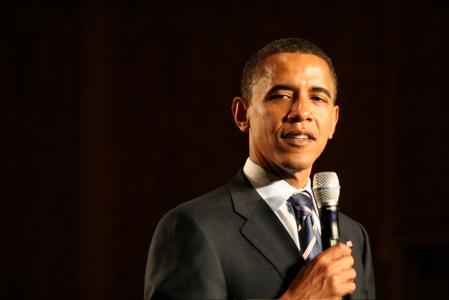Magazine asks whether Obama is ‘chess master or pawn?’
Barack Obama at a New York fundraiser for his first campaign for the United States Presidency. (Photo by Flickr user Barack Obama.)
With the 2012 United States presidential election less than 9 months away, questions regarding President Barack Obama’s competency and his still-developing legacy are increasing.
The Atlantic poses the question of whether Obama is a chess master or a a pawn in the cover story for the March edition of their magazine. James Fallows, writer of the piece, examined whether Obama’s time in office has been better defined as a political tactician constantly thinking of his next moves, like a chess master, or as a president struggling to make his mark against better opponents as well as his own staff, a pawn.
“What matters most about a president is whether he learns from his inevitable failures and overcomes his inevitable weaknesses,” said Fallows, who claimed Obama is becoming a chess master. “I think in the last year we’ve seen signs of President Obama doing that.”
According to Fallows, those weaknesses include Obama’s relative inexperience in the Senate.
“There were areas in which he wasn’t really prepared for what it would take to deal with the Congress and deal with some other problems,” he said. “About a month before he won the election against John McCain, suddenly the landscape changed (from the Iraq War). There was the financial collapse, and something that had not been part of Obama’s background at all, world fiscal management, dealing with financial crises, etc. Suddenly that was his responsibility and the dominating fact, at least for the first two years of his presidency.”
Other weaknesses for Obama, according to Fallows, include the “Mr. Spock problem,” or a perceived coldness in Obama’s demeanor. Fallows said Obama can inspire people on the mass scale, citing the speech the president gave after the 2011 Tucson shooting. However, President Obama lacks the patience of presidents Bill Clinton and Ronald Reagan on an individual level.
The successes of President Obama, according to Fallows, are highlighted by containing the Iraq War and improving U.S. relations with China, among others.
“You don’t end up governing on the issues that you run on. That’s the case for most presidents, so that is where he has had to try hardest” said Fallows. “I think, probably, the second thing is recognizing the reality of the polical opposition he faces. He’s become more confident in being able to draw lines and say I stand for this. They stand for that. Take your choice.”
The question of Barrack Obama’s mastery of the presidency will be a topic of much debate in the upcoming election, and his legacy may well be defined by its outcome.
